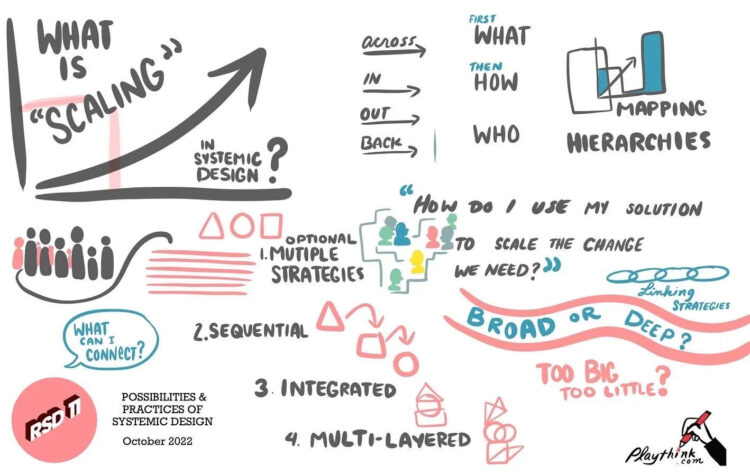Scaling Matters
In its final offering, the in-depth course 'Strategic Design for Social Innovation' will prepare upcoming designers to be more “literate in scaling” when addressing societal challenges with impactful systemic change. Wondering what this entails? Read all about it here.
Lab director Ingrid Mulder, Maria Belén Buckenmayer and Ryan J.A. Murphy, wrote an article reflecting on the course’s content and results after a previous run. The insights analysed reveal crucial takeaways that set this course apart, asserting that advanced scaling strategies are imperative for systemic innovation. This article gives a preview of new profound strategies, showcasing what students can achieve within a remarkably brief timeframe.

Sketch by Patricia Kambitch
Scaling and social innovation?
Over the past decade, scholars have adapted the original idea of scaling from business to differentiating various ways to scale that are more appropriate in the context of social innovation. Scaling used to be – and often still is – thought of as a panacea: it is the end-result, purpose, or answer to what we are trying to achieve.
However, scaling remains ill-defined in systems change; we do not have a commonly agreed-upon language for what we are scaling, where we are scaling, or how we are scaling change in social systems. Instead, systemic designers refer to a mix of jargon from (social) innovation, design, systemic change, and/or transition design.
Although these fields share similar ambitions for scaling, Mulder, Buckenmayer and Murphy (2022) argue that systemic designers need advanced scaling strategies to achieve systemic innovation. The complexity of issues addressed by systemic design requires a better understanding of how scaling systems change happens and demands building capabilities for designing for these different dimensions and directions of scale. In short: scaling matters.
‘Strategic Design for Social Innovation’
For the last time, the elective course ‘Strategic Design for Social Innovation’ prepares upcoming designers to be more “literate in scaling” when addressing societal challenges with impactful systemic change. Students develop a visual essay in which they propose a design strategy that helps a selected social innovation practice in scaling towards systemic change.

A collage of students’ visual scaling strategies
Developing new dimensions and layers of scale
In a previous run of the course, students demonstrated a high richness in their scaling strategies distinguishing different dimensions and layers of scale. Students who first thought about “Where” to scale found themselves capable of articulating the “What” to scale and “How” to scale such that whole-systems change may be achieved, not simply how to make the initial service offering more successful.
Ingrid Mulder, Maria Buckenmayer and Ryan Murphy (2022) reflected on the contents of Strategic Design for Social Innovation and the achievements of the students. They found that a typology of nine dimensions for scaling systems change could be articulated.
Scaling is an interactive and iterative process where different approaches to scaling may be used at different layers of a system and/or stages of a strategy. Scaling one dimension may even be necessary to prepare for scaling another, meaning that the scaling typologies above can be employed in many ways.
Where are we now? Mulder, Buckenmayer and Murphy (2022) have established a four-level framework for scaling literacy, illustrating how designers might differ in terms of scaling literacy. In this year’s course, we hope to see new scaling capabilities toward literacy level 3, while learning from each other in this highly relevant design field in an increasingly complex world.

The multi-level framework illustrating four levels of scaling literacy
Join us in our call for scaling literacy
Since students have already shown their abilities in developing advanced scaling strategies, we are seeking to develop systemic design’s methodological practices further and expand the capabilities and action repertoire of future generations of systemic designers. If you want to be involved in the further development of scaling literacy toward achieving systemic change and social innovation, you are welcome to join us in the course!
Curious to know more about scaling literacy and the previous course results? Read the full paper ‘A Call for Scaling Literacy’.

